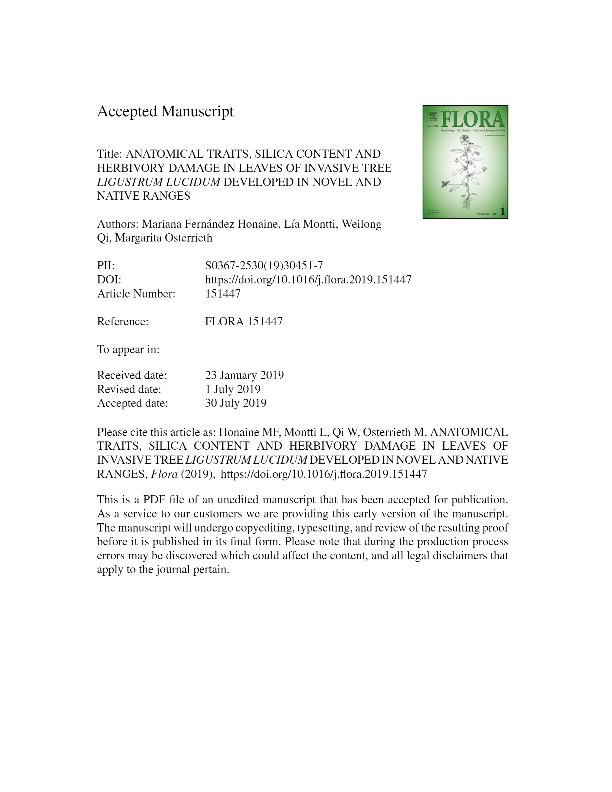Mostrar el registro sencillo del ítem
dc.contributor.author
Fernández Honaine, Mariana

dc.contributor.author
Montti, Lia Fernanda

dc.contributor.author
Weilong, Qi
dc.contributor.author
Osterrieth, Margarita Luisa

dc.date.available
2021-01-11T17:13:35Z
dc.date.issued
2019-09
dc.identifier.citation
Fernández Honaine, Mariana; Montti, Lia Fernanda; Weilong, Qi; Osterrieth, Margarita Luisa; Anatomical traits, silica content and herbivory damage in leaves of invasive tree Ligustrum lucidum developed in novel and native ranges; Elsevier Gmbh; Flora; 258; 9-2019
dc.identifier.issn
0367-2530
dc.identifier.uri
http://hdl.handle.net/11336/122357
dc.description.abstract
Ligustrum lucidum is an invasive tree in many regions, but scarce work analyzes its anatomical or eco-functional traits and its relation with herbivores, an important issue to be addressed by invaders in new areas. On the other hand, amorphous silica accumulation is an important anti-herbivore component in grasses, but its role in eudicots has been little explored. To analyze if anatomical and eco-functional traits, silica accumulation and herbivory damage are modified by phenological stages or environmental conditions, and if herbivory damage is negatively correlated with silica content, we analyzed shade and sun leaves of different ages from adult trees in novel (Argentina) and native (China) areas. Leaves were scanned, dried and weighed for specific leaf area estimation. Herbivore damage was calculated as the proportion of leaf surface eaten. Silica content was quantified through calcination and digestion techniques. The results showed that leaves from China had higher SLA than leaves from Argentina, and shade or young leaves had higher SLA than sun or old leaves. Herbivory was higher in old leaves compared to young ones. Mean silica concentration was 1.73%; it was higher in leaves from Argentina than in leaves from China and it increased with leaf age. Differences in silica concentration or SLA between samples are probably due to environmental conditions such as pollution degree, soil Si content, water availability and / or temperatures. The age of the leaves affected the values of SLA, silica content and herbivory damage. Along the life of the leaves, silica content increased approximately five times in ten months: older leaves became thicker, with a higher silica content, and a higher herbivory damage. Considering the same age of the leaf, silica concentration and herbivory damage were not correlated, therefore it was not possible to associate the silicification process with an antiherbivore role in this species.
dc.format
application/pdf
dc.language.iso
eng
dc.publisher
Elsevier Gmbh

dc.rights
info:eu-repo/semantics/openAccess
dc.rights.uri
https://creativecommons.org/licenses/by-nc-sa/2.5/ar/
dc.subject
LEAF ANATOMY
dc.subject
LEAF ONTOGENY
dc.subject
SILICIFICATION
dc.subject
CHINA
dc.subject
ARGENTINA
dc.subject
INVASION
dc.subject.classification
Ciencias de las Plantas, Botánica

dc.subject.classification
Ciencias Biológicas

dc.subject.classification
CIENCIAS NATURALES Y EXACTAS

dc.title
Anatomical traits, silica content and herbivory damage in leaves of invasive tree Ligustrum lucidum developed in novel and native ranges
dc.type
info:eu-repo/semantics/article
dc.type
info:ar-repo/semantics/artículo
dc.type
info:eu-repo/semantics/publishedVersion
dc.date.updated
2020-11-26T17:45:15Z
dc.journal.volume
258
dc.journal.pais
Alemania

dc.description.fil
Fil: Fernández Honaine, Mariana. Universidad Nacional de Mar del Plata. Facultad de Ciencias Exactas y Naturales. Instituto de Geología de Costas y del Cuaternario. Provincia de Buenos Aires. Gobernación. Comisión de Investigaciones Científicas. Instituto de Geología de Costas y del Cuaternario; Argentina. Consejo Nacional de Investigaciones Científicas y Técnicas. Centro Científico Tecnológico Conicet - Mar del Plata. Instituto de Investigaciones Marinas y Costeras. Universidad Nacional de Mar del Plata. Facultad de Ciencias Exactas y Naturales. Instituto de Investigaciones Marinas y Costeras; Argentina
dc.description.fil
Fil: Montti, Lia Fernanda. Consejo Nacional de Investigaciones Científicas y Técnicas. Centro Científico Tecnológico Conicet - Mar del Plata. Instituto de Investigaciones Marinas y Costeras. Universidad Nacional de Mar del Plata. Facultad de Ciencias Exactas y Naturales. Instituto de Investigaciones Marinas y Costeras; Argentina
dc.description.fil
Fil: Weilong, Qi. Nanjing Forestry University; China
dc.description.fil
Fil: Osterrieth, Margarita Luisa. Consejo Nacional de Investigaciones Científicas y Técnicas. Centro Científico Tecnológico Conicet - Mar del Plata. Instituto de Investigaciones Marinas y Costeras. Universidad Nacional de Mar del Plata. Facultad de Ciencias Exactas y Naturales. Instituto de Investigaciones Marinas y Costeras; Argentina. Universidad Nacional de Mar del Plata. Facultad de Ciencias Exactas y Naturales. Instituto de Geología de Costas y del Cuaternario. Provincia de Buenos Aires. Gobernación. Comisión de Investigaciones Científicas. Instituto de Geología de Costas y del Cuaternario; Argentina
dc.journal.title
Flora

dc.relation.alternativeid
info:eu-repo/semantics/altIdentifier/url/https://www.sciencedirect.com/science/article/abs/pii/S0367253019304517
dc.relation.alternativeid
info:eu-repo/semantics/altIdentifier/doi/https://doi.org/10.1016/j.flora.2019.151447
Archivos asociados
